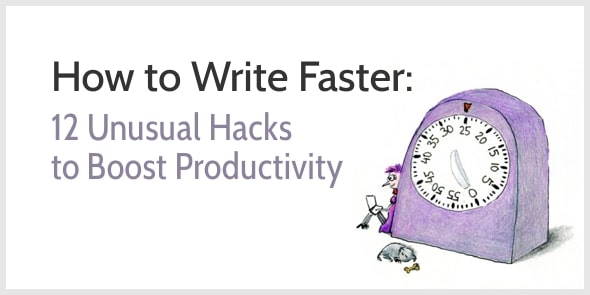
Howard feels fed up with writing.
He started working on his blog post yesterday afternoon, and wrestled with his first draft until almost midnight.
Today, he’s revising his post. He wants to create something less woolly and more interesting. He wants his content to flow with a pleasant rhythm. He wants to write content his readers will truly enjoy.
But man, creating that post seems to take ages.
Why can’t he speed up?
Howard wonders whether he’s missing a trick. He tries to write faster. But the harder he tries, the slower he seems to go. And that’s when he gets so frustrated with himself he hardly can write anymore. His inner critic has a field day, telling him he’s too slow; he lacks talent and he’ll never get good enough.
What should Howard do?
Good writing takes time. That’s true. But that doesn’t mean you can’t speed up. When you adopt the right habits and mindset, you can write surprisingly fast.
In the past years, I’ve read many books about productivity and writing, and I’ve learned a few crazy and counter-intuitive tricks to massively shorten the time it takes me to write good content.
Want to write faster and better? Get my best writing tips here > > >
1. Write while groggy
 I used to think I had to be bright and breezy to be able to write.
I used to think I had to be bright and breezy to be able to write.
Or failing that, I’d write late at night when time was finally running out to meet a deadline. ⠀
⠀
But I’ve discovered, I’m better at writing first drafts when still half-asleep. First thing in the morning. (I think it’s because my inner critic likes a lie in.) ⠀
⠀
Research suggests we’re more creative when we’re at our groggiest. So if you’re a nightowl, try writing as soon as you get up. And if you’re an early bird, you might want to try a late writing session.
There’s also some indication that a modest amount of alcohol unlocks our creativity because we’re more likely to break out of thought patterns. So, “Write drunk, edit sober” might be good advice. And if you don’t like to drink, being slightly sleep-drunk might work, too.
2. Set a timer
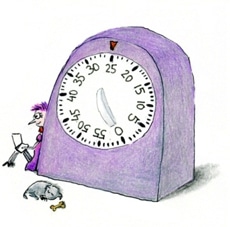 Setting a timer to write seemed, at first, a crazy idea to me. ⠀
Setting a timer to write seemed, at first, a crazy idea to me. ⠀
⠀
When I’m in a good writing flow, why would I want to stop? ⠀
⠀
However, I’ve found that stopping while in a flow, makes getting back to writing a lot easier because I still know what to write next.
Using a timer also helps beat procrastination. When I see the time ticking away, I’m more aware I’m wasting time, so I find tactics to keep writing. I might write gibberish. But I keep working instead of checking email or Twitter.⠀
⠀
The Pomodoro technique suggests 25 minutes of dedicated work, followed by 5 minutes’ break. It’s a good way to keep your energy level up, avoid sitting too long, and stay focused. ⠀
⠀
Before I used a timer, I needed deadlines to get work done. It’s taken me some practice, but now I can write even when a deadline isn’t near. I can focus on doing the work, and writing has become less stressful, more enjoyable. I get more writing done in less time. ⠀
3. Make writing a choice
 How often do you tell yourself “I should write” or “I have to write more regularly?” ⠀
How often do you tell yourself “I should write” or “I have to write more regularly?” ⠀
⠀
I used to do it all the time, but it increased my resistance to writing, and then made me feel guilty if I didn’t write. ⠀
⠀
I’ve learned to change my self-talk, and to make writing a choice rather than a chore: “I want to write” or “I choose to write.” ⠀
⠀
In his book “The Now Habit,” Neil Fiore suggests that the self-talk of procrastinators often reinforces the idea that a task is unpleasant, and that we don’t have control: We have to do it or else …⠀
⠀
Changing our self-talk puts us back in control. We make clear choices. We act as grown ups. Whether you have to call your mother-in-law, should clean up the attic, or must write more, try changing to “I choose to …” or “I want to …” It’s surprisingly effective.
4. Make a specific commitment
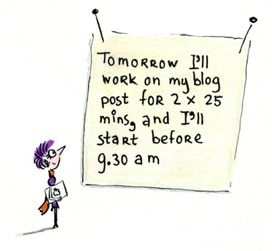 Do you ever wonder where your day has gone?
Do you ever wonder where your day has gone?
And get frustrated because yet again, you’ve not written that all-important sales email or not started writing your next blog post?
I always thought getting something done had to do with willpower and setting the right goals.⠀
⠀
But I’ve learned that one simple trick can be amazingly powerful. This trick is described in the “British Journal of Health Psychology.” Researchers found that understanding the benefits of exercise doesn’t increase the amount of exercise we do.⠀
⠀
What makes us stick to an exercise regime is the simple act of writing down when exactly we’re going to exercise next week.⠀
⠀
The research shows that without a specific plan only 35% of people exercised at least once a week. But a whopping 91% of people who had written down their plan exercised at least once a week.
So, I sit down every evening and I make a specific writing commitment for the next day. I decide which project I’ll work on, for how long, and by what time I’ll get started.
An extra advantage of this approach is that my brain start thinking about my writing project (even when I don’t realize it), so starting to write the next day becomes easier.
5. Chop up the writing process
 Does writing feel like an insurmountable, big task?
Does writing feel like an insurmountable, big task?
You don’t have to do everything all at once.
Start with considering the different parts of your content. A blog post contains a headline, subheads, opening, main body, and final paragraph. And sales copy usually contains a value proposition (headline + subhead), a list with bullet points, detailed copy, testimonials, and perhaps a list with questions and answers.
Next, cut the writing process into steps: idea generation, research, outlining, writing a crappy first draft, revising, editing, and formatting.
When each writing step is as small as possible, writing your next sales page or blog post becomes a breeze.
6. Take advantage of percolation
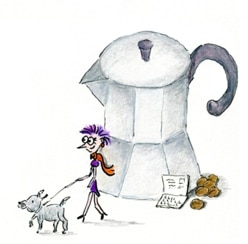 As you’ve cut your writing project in doable tasks, you can also spread the work over more days.
As you’ve cut your writing project in doable tasks, you can also spread the work over more days.
When you aren’t writing, your brain still continues thinking about your content. It’s called the diffuse mode of thinking—when you let your mind wander freely.
The diffuse mode of thinking helps you make new connections and get fresh ideas. So spreading your writing over more days, allows you to boost your creativity and make your content even better.
7. Get in the mood to write
 Struggling to get started? Procrastinating?
Struggling to get started? Procrastinating?
Try a short writing ritual to get in the right mood. Rituals work because they can boost your motivation and confidence. To me, it feels like a ritual kicks my brain into writing gear.
My ritual is to:
- Switch my computer on
- Open the document I want to work on
- Make a cup of tea
- Set my timer for 25 minutes
- Start typing—even if it’s just gibberish at first
Don’t make your ritual too complicated as it might take up too much time.
8. Avoid rabbit holes
 We’ve all done it.
We’ve all done it.
You’re writing, and writing, and writing. And you feel like you’re in a good flow.
Then, at once, you miss a piece of information. You open up Evernote, and search for some data you think you’ve saved. Or you open your Kindle app, and search for the book that for sure must have a useful quote. About half an hour later, you’re still reading, and when you try to get back into your writing flow, you feel stuck. You’ve completely lost your train of thought.
Next time you miss a piece of information, write down “TK.” That’s editor’s jargon for “to come.” Keep writing your draft, and add the missing information later. Avoid going down rabbit holes because they’re time sucks.
9. Build a bridge to tomorrow
 Building bridges is one of my favorite tips from the book “The Creative Habit” by Twyla Tharp.
Building bridges is one of my favorite tips from the book “The Creative Habit” by Twyla Tharp.
Twyla Tharp is a choreographer who has created more than 130 dances. Tharp is so productive because she has built a solid creative habit. This is what she suggests about building bridges:
Ernest Hemingway had the nifty trick of always calling it a day at a point when he knew what came next. He built himself a bridge to the next day. I cannot think of a better creative organizational tool. (…) I try to do a variation of the bridge. I always quit for the day before everyone’s totally exhausted. I stop when there’s still energy left in the room and I know where we would have gone if we hadn’t stopped. Knowing what comes next is like crocheting: The end of one day knits into the next, and you wind up with a garment that’s flexible but strong.
How I build bridges when writing:
- Each evening, I decide what I want to write the next day
- I outline one day, start writing the next so I have a starting point
- I review headline options before going to bed, and when I wake up the next morning, an even better headline usually pops up in my mind
Don’t deplete your creative energy, so you can look forward to re-starting your work the next day.
10. Rescue lousy drafts
 One of the biggest productivity killers is to leave writing projects unfinished.
One of the biggest productivity killers is to leave writing projects unfinished.
Before you abandon a topic, and start another article, consider why you were excited to write about this topic. Why would your readers be interested in it?
Try to rekindle that excitement you felt when you started your project, and then look for what’s good in your copy. Don’t get bogged down by what’s not working. Instead, develop your article based on what’s working already.
11. Slow down
 In his book “Accidental Genius,” Mark Levy describes how Robert Kriegel, a mental coach, trains Olympic athletes.
In his book “Accidental Genius,” Mark Levy describes how Robert Kriegel, a mental coach, trains Olympic athletes.
During a practice run he found his sprinters were tense and tight. Rather than asking them to up their efforts, he requested they run the next practice round at 90%.
The result?
Everyone ran faster the second time!
When writing first drafts, I follow the 90% rule. It helps me adopt a zen mindset, to ignore my inner critic. I focus on writing without cramping up. I write much faster—despite taking it slowly.
12. Practice your writing muscles
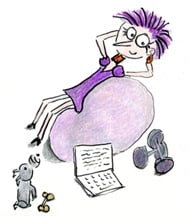 To nurture a healthy writing habit, start by setting your goal so ridiculously low that it’s easy to stick with it.
To nurture a healthy writing habit, start by setting your goal so ridiculously low that it’s easy to stick with it.
Stephen Guise wrote his book “Mini-Habits” by setting himself a target of writing just 50 words a day. He argues that writing 50 words a day is such a stupidly low target, that he could even do it when he was busy, felt tired, or had a thumping headache.
Jeffrey McDonnell, an assistant professor, devotes the first hour of the day to academic writing. He calls it his 1-hour work day. I try to follow a similar practice as much as I can.
A healthy writing habit helps you keep writing—even when it feels tough.
Want to write faster tomorrow?
Here’s what to do today:
- Download a timer app
- Choose the project you want to work on
- Make sure you have an initial idea about what the project entails
- Decide how long you’ll write tomorrow—don’t be overly ambitious; set a doable goal
- Note down at what time, or before what time, you’ll start writing
Want to write faster and better? Get my best writing tips here > > >

Grab the embed code below to display the image on your website:
PS Thank you to Danny and Gisele at Neomam for their inspiration and advice on the infographic.
Recommended course:
Write It, Don’t Fight It
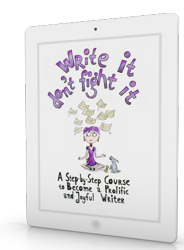
A Step-by-Step Course to Become a Prolific and Joyful Writer
“Since starting the program, I’ve written and published 3 blog posts, a 300% improvement over my track record.”
~ Deborah Reidy
![]()
Recommended reading on writing faster:
4 routines that cut my writing time by 50%
A 5-day plan for creating weekly blog posts (even if you have no time)
How to become a prolific writer: 6 common myths quashed


Henneke,
Thank you so much for these tips!
I especially like the one about building a bridge to tomorrow. I always feel like if I am on a roll.. I need to keep going and finish before I can go to bed.. even if that means staying up half the night.
I am going to try building a bridge to tomorrow. I LOVE that idea!
Sherry
Thank you, Sherry. I hope you’ll enjoy building bridges. Happy writing! 🙂
Awesome post Henneke! I think that we writers often take ourselves far too seriously. As a result each writing session becomes like a death march to an unsatisfactory end! You manage to demystify the process and, when approached with a certain lightness and humor, writing becomes fun again! Thanks for sharing these great ideas. (I especially love the illustrations.) Keep up the great work, we appreciate it! 😉
Such a good point, Jarius: We shouldn’t take ourselves to seriously. I like your suggestion to approach the writing process with lightness and humor. It works!
This is awesome! Love the tips to help me write better!
Thank you, Tracy. Happy writing!
I loved your writing course and this article just awesome. Thanks Henneke
Thank you, Obeydul. Happy writing!
Thumbs up Henneke. The above content is comprehensive and Crystal clear. The flow is excellent as always. Thank you.
Thank you for your compliment, Denniz. Happy writing!
“Write while groggy.” A lifesaver! I’m in my 80’s, and there are moments in the day when I can’t quite wake up but don’t want to waste those minutes. I never thought of using this time to write. I know I can do it–I can write while groggy. And I’ll love it. And I’ll love the extra time it will give me.
Thanks for a bolt of creative lightning.
It’s a weird idea, right? But I find it often works for me. I hope it’ll work for you, too.
You forgot the guilt. Every time I read an article about writing faster or more productively, I end up feeling more guilty than inspired. So I finally decided that I would just go at my own speed and enjoy it.
But your tips are good because they’re fun. I’ll try them out.
Yes, that’s a good principle. Go at your own speed and focus on the writing task at hand. If you do that, writing will give you more joy (and as a side benefit, you’ll probably go faster, too). But the key for me is also in the enjoyment. Happy writing!
Thanks! I loved your snackable writing course and this article is very helpful too. Keep doing the good stuff.
Thank you, Ruchika. Happy writing!
I love writing and I am so happy that I came across your blog. Your tips and tricks are gonna help me BIG time to improve my writing. Thank you
That’s great 🙂
Happy writing!
Very interesting – I never thought about speeding up as a means to improving… ok, that will be my push to start doing that now!
In my experience, it’s useful to experiment with writing speed and find the speed that works for you. Happy writing!
Henneke,
I can’t tell you how much helpful this post! I have learned a lot from this post. Avoiding rabbit holes is a big one for me. I just need to just avoid what’s needed to be added while I’m writing because as you said, the momentum to write or the motivation to write just breaks when we get off the writing pad and put our brains into something else.
This is of great help!
Arfa
Yes, avoiding the rabbit holes was also a revelation for me. It makes a big difference.
I’m so glad this post was useful to you! Thank you for stopping by, Arfa.
Useful article for those who are looking to write faster.
I don’t like to write faster. I take some quality time to write so that I can generate some quality stuff.
Hello Henneke
Thanks for the informative post; I’ll be saving it or future reference.
Like you, I find setting timer to be particularly useful, although I set mine for one hour. Doing so keeps me disciplined, and I always feel like I’ve achieved something at the end of the day when I look back at the blocks of time I’ve marked off.
Timers work amazingly well. I’m feeling slightly envious that you’re able to work non-stop for a full hour!
Thank you for stopping by (and for tweeting!) I appreciate it 🙂
As usual for Henneke, this is good to excellent advice.
I use her advice almost every day, therefore, as a favor in return I will take some time to improve it, because half of the important first advice, shows a lack of knowledge about how our brain works.
First: neuroscientific research confirms the existence of Larks and Owls. Larks are most productive in the morning, Owls in the evening, but most of us belong to the middle and are Owlarks, we can be productive either way. From the research we also learn that Larks are more successful than Owls and that people in creative jobs often are Owls or function as Owls.
A problem is that this research does not take into account what I call Pseudo-owls.
Real Larks raise early and go to bed early, real Owls work late and get up late. In my work with executives and other professionals I discovered that an ever growing number of people close their eyes late and get up early. I write “close their eyes” and not “go to bed” because they often keep busy with their little screens in bed. These people chronically function in the groggy state of sleep-deprivation that ruins their intellectual productivity.
Secondly: doing important intellectual work in the morning is the best only when two conditions are fulfilled.
1. you had enough sleep (for 75% of people this is 7-8 hours)
2. you do not touch your smartphone or any other tool connected to the internet, before you finished the important work.
Why is that so?
The core of the matter is that when we sleep our archiving-brain works very hard to select, (re)organize and store trillions of bits of information. In the last part of the night, it prepares us for the day that comes.
Hence, the best thing you can do to be creative and intellectually productive, is to follow Hennekes last advice: 1,5 hour before you should close your eyes to sleep, you take a very last look at your mails and messages. So you have all the information you need to write down the three most important things you are going to do the next day. Then you do whatever you want (except being busy with computer, tablet or smartphone), go to bed, wake up, go through your morning routine and then do the important work first BEFORE YOU OPEN YOU LOOK AT ANY MAILS OR OTHER MESSAGES. Getting busy with your smartphone before important intellectual work ruins a lot of the important, creativity enhancing work your archiving brain has done for you during your sleep.
By the way, this is the reason why people often have very creative ideas under the shower, if they shower before getting busy with the never ending stream of interesting but irrelevant information on their screens.
I do not want this to look like publicity, but if you want to read more about how to get back the optimal functioning of your brain you can find free information on my website http://www.brainchains.info tab free texts or in my book “BrainChains” or in the concise version I wrote trying to apply Hennekes advise “How to unchain your brain”
Hi Theo
Thank you for stopping by to share your wisdom. I agree with you that we do our best intellectual work when we’ve had enough sleep.
I want to be careful, though, to suggest you have to sleep well to be able to write. Many people suffer from chronic fatigue (including myself) or are otherwise sleep-deprived. Stressing the importance of sleep can be demotivating and lead to procrastination.
I used to think I had to feel bright and breezy to write, so when I didn’t feel fully awake, I’d procrastinate. I’ve learned that often I can write, even when I’ve not had enough sleep and still feel tired (within reason of course).
Hi Henneke,
Thank you for another great piece of inspiration. I’m going down many paths right now and need to merge them into one good trail, anchored by regular writing.
Lots of help in your post. Love the book references as well.
All the Best.
I like how you put that: merging all the paths into one good trail. I found that quite a challenge!
Thank you for your lovely comment, Barry. Always good to see you!
3 things helps me a lot.
– Having an idea to write. I keep jotting down ideas everyday and then write on Sundays.
– I read a lot, so I have different perspective. And my life experiences helps.
– I had made a commitment and it sucks to miss it. So it pushes me.
That’s my process.
Loved your ideas – Henneke. Thank you
It sounds like you have a solid system in place to keep ideas flowing and to write regularly. Fab!
What a great blog to help us writers who have trouble finishing things (like your wonderful copy writing course:)
Set a timer and build a bridge to tomorrow are two of my favorites. The self-talk reminder….’I want to write’ is powerful.
I love the images too.
Thanks Henneke!
This post was a long time in the making—I have experienced all the troubles to finishing pieces myself, too. I found the self-talk amazingly powerful, too. And not just for writing!
Thank you for stopping by, Christine. I appreciate it.
Happy writing!
Love the infographic. I was about to ask if I could please show it off on my website when I saw the embed code. Thank you.
Writing while groggy does not really work for me because all I end up doing is–at the computer, doze with my finger on one key and wake up with a jolt to find pages full of “k”. With paper and pencil, weird squiggles.
The timer works for me. I also have a playlist (old childhood habit) where I target to finish something before the song ends or before two songs end. Totally works for me. And yes, yay! for Pomodoro–healthiest thing ever. Of course, since I work from home, my doorbell and my landline phone in the other room take care of that little detail!
What a fab post, Henneke! But you already know I am a big fan of your writing and your art. So delightful! Thank you!
Falling asleep at the computer doesn’t sound like a good idea! I guess we’re all different and have to find out what works for us individually.
I like your idea of a playlist and finishing something before a song ends.
Thank you for stopping by, Vidya, and for sharing my infographic on your site.
Loved your article as I always did Henneke and make it a point to visit often! All your tips make complete sense though I found this one a little strange i.e to write while we at our groggiest best. Honestly I am an early bird and at my best in the morning and this is the time when I am most prolific. I will definitely give this a try, by trying to write late night atleast once.
Many thanks!
Wow this post is great. Normally I see writing as a grueling task but with what I have read on your blog today, I will rekindle my passion for writing and apply your tips. Thanks for sharing.
Great 🙂 Happy writing!
Thank you for these tips. Personally I have discovered that writing while groggy helps me in putting down my first draft, without having to really task my brain. My greatest take away here was your tip on avoiding rabbit hole. Now I know why I usually jump from writing to doing other things on the Internet. I hope to stop avoiding that hole from now on.
I almost always write my first drafts while groggy, too. It feels like I can dedicate the part of my brain that’s already moderately awake to my writing efforts (while my inner critic is still sound asleep). It works like a treat 🙂
Happy writing, and thank you for stopping by, Adedapo.
A perfect post arriving at a perfect time! I’ve not only been going down the rabbit hole, but I’ve been living in it. 😉
However, after reading this post, I’ve got some great takeaways that I’ll be implementing starting in the morning (before I’m fully awake…..lol).
Loved the idea of writing first thing and I’ve heard of the Pomodoro method but never thought of it for my writing. Hopefully these tips can help jumpstart me and get me out of the writing doldrums I’ve been in. Thank YOU!
Sometimes a rabbit hole can be enlightening as we come across interesting pieces of information, fascinating people, and new research. But yeah, it becomes a distraction when we want to get something done.
Happy writing, Bobbi. And thank you for stopping by.
Hi Henneke! Great post. I’ll definitely use these tricks to survive my Personal Branding class, since we are to publish two blogs per week for the duration of the semester. We started publishing blogs three weeks ago, and we still have six weeks more to go. I am already suffering from a brain drain. Thanks for the tips.
Oh my, writing two blog posts a week for 9 weeks in a row sounds challenging.
Good luck with your challenge, Diana. I hope your posts don’t need to be too long!
Hi, When I start to write, always in confusion mood, whether I will commit a mistake. How to overcome this. Pls suggest.
The idea with writing is that you first write a poor draft, and then revise it to correct any mistakes. In my first drafts, I have lots of mistakes.
You can read more here: https://www.enchantingmarketing.com/writing-shitty-first-drafts/
And here: https://www.enchantingmarketing.com/revision-process-in-writing/
Writing while groggy is just so surprising! If I try writing while groggy, it’s safe to say that 9 out of 10 times i’ll probably end up napping on the keyboard haha… So it might not be for me sadly — but it’s good to see this work for alot of people on here!
The other points I agree with, especially the bridge to tomorrow! By having certain things scheduled for the next day, it really does help spike up my productivity at the start of that day! If anything, i’d say that’s one of the best tips for somebody looking for ways to start their work day off with a bang!
Thanks Henneke for a wonderful article 🙂 Keep it up!!
I’m glad you’ve discovered the bridge to tomorrow already, George. I’ve found myself more aware of this trick and using it more often, it really helps beat procrastination. Happy bridge building!
Thank you for stopping by again.
I agree with number 1. When I’m feeling a little bit groggy, I have tried before to write 3 2,000-word articles in just 3 hours and I wrote it from 11PM to 2AM. Such good times.
All the Best,
Jan Limark
That sounds like a super-productive session!
Hey Henneke,
That’s a cute infographic I must say – and wonderful points too.
I am sure everyone is in general guilty of a handful of lousy drafts 🙂 I have some and yes it is quite important to remind ourselves about why those drafts/ideas sounded exciting to us when we started writing them 🙂
Thanks for sharing this awesome piece – lots of hard and dedicated work detected 🙂
Cheers,
Jane.
I’m so glad you like the infographic, Jane. It was a ton of work but also a lot of fun to create!
Thank you for stopping by and for sharing.
Where has this list been all my life?
I feel your pain! I’m sorry it took me so long to create this list … almost five years. But at least it’s here now 🙂
Hi Henneke,
Hope you had a good week off. You certainly came with some impressive content here.
I use the Pomodoro technique when writing all the time. At first, I was like you. I thought this would negatively impact my rhythm … but it actually did the opposite.
I had to laugh at the point about avoiding rabbit holes because I do this from time to time. Even when using the Pomodoro technique. It’s clearly something I need to resolve.
Great come back post.
Looking forward to more in 2 weeks.
– Andrew
I really missed writing and publishing my blog post last week. It was such a weird week, and I got confused about what day of the week it was. But it did help me get a ton of other stuff done, so I feel more in control of my life again 🙂
Going down rabbit holes isn’t always bad because it can generate new ideas. It’s only bad if it hampers your productivity.
Thank you for stopping by again!
This is over the top Henneke. I love the illustrations/infographic. There’s a book in the making!
I haven’t tried alcohol and writing. I write early in the morning and booze for breakfast doesn’t seem appropriate;) But, I can say that I’m 10x better at crossword puzzles after a glass of red wine. Words pop into my head like magic, so obviously, some gatekeeper shuts down in the brain.
A practical tip – I made a poster that says TK (CTRL+F) in big letters and taped it above my desk to help me make that little hack a habit.
How interesting that you’re better at crossword puzzles with a glass of red wine! Isn’t it fascinating how our brains work?
I also like your idea of a poster. Thank you for stopping by, Cheri. 🙂
Hi Henneke,
I loved your post, and had to laugh when I read #3, because it is so me! Anytime I remind myself I have to do something, there’s a rebellious little voice in my head that says, “Oh, really? Well, we’ll see about that!” All too often, the little voice wins….
Lisa
Ha, I think I know that little voice, Lisa. Because I hear that in my head, too.
You might be surprised how quiet that voice becomes when you stop thinking “I have to…” It sounds crazy, but it made a big difference to me.
Happy writing!
I don’t know what I enjoyed most; the refreshing productivity tips or the enchanting illustrations. Honestly, Henneke, this is both beautiful and useful.
I like the idea of #9. So often I think I’ll just plow on while I’m in the swing of writing. But the idea of putting on the brakes and setting yourself up for a head start tomorrow is smart. I’ll have to try it.
Thanks so much for taking the time to unearth some new productivity tips.
– David
Thank you so much for your beautiful compliment, David. I had a lot of fun creating this infographic. Fortunately, I didn’t realize how much work it would be; otherwise I would have never created it!
Let me know how you get on with “building bridges?” I’d love to hear how it works for you.
Happy writing!
Great tips – I’m a bit of a night owl, but I can still try to write early in the morning 🙂
Also, I completely agree on goals – the clearer they are, the better!
Yes, try it. You might surprise yourself how much easier it is to stay focused in the morning—even if you think you’re still too sleepy.
Thank you for stopping by, Andrea.
Wow Henneke,
A bagful of writing tips!
These tips are always useful and to bloggers like us who are always in the lookout of rabbitholes and procrastination, this is a great savior.
I practice the dividing the writing to parts thing and also I get into the mood of writing prior to writing but the other things are just awesome and I can’t wait to try them out.
Thanks for the post.
Have a great rest of the week.
-Swadhin
Thank you for your lovely comment, Swadhin.
So many of us struggle with procrastination and prefer going down rabbit holes to doing the real work. Actually, I do think going down rabbit holes can be productive, too; it can be a good way to generate new ideas. So, I try to allocate time to allow myself to explore freely and follow any rabbit hole I like 🙂
You seem to have figured out good ways of getting into your writing groove already!
Happy writing!
Great Henneke – I am seriously guilty of “rabbit holes”. I can’t resist stopping to check the facts.
“TK” is a wonderful solution – I’ve already started doing it and it’s getting my crappy first draft done in record time!
I fix it all up when I am relaxed in edit mode.
Thank you so much – Paul – cold and rainy Sydney
I find it hard to resist fact checking and looking up quotes, too. And I must admit, I’m not always disciplined enough to use the “TK” trick. When I get tired, I’m prone to breaking my own rules!
I hope the sun shines on you again soon, Paul. Happy writing!
This is brilliant Henneke!
I was quite excited to read that I have already been doing a few of these tricks 🙂
It’s given me more motivation to keep going.
Great! It sounds like you’re pretty good at finding your writing groove, Steph. Happy writing and thank you for stopping by.
I love the post, Henneke!
Two posts in a row with dancer genius Twyla and well, I love and appreciate her work since I took and studied modern dance (wwaayy) back in college:)
I admit the rabbit hole can be fun, interesting, and an idea generating pathway, too, sometimes! But, no way to get any real work done. Time to stop reading and learning all the time and remember to write down, develop and grow (construct a bridge?) with the satisfying work of writing well…or as best I can…
Here’s what’s funny, Henneke…as I go, instead of hating to write and feeling bogged down with it, lately I’ve been feeling like I have so much writing I want and/or need to do and well, it’s becoming more fun and even motivating for me! I must be ill:(
Hope it warms up for you in England and for us here in Pennsylvania, too! A little summer fresh air does the writing mind good! Ha
As always, you are so generous in sharing great insights and Henrietta seems to be basking in her starring role in this valuable new InfoDrawing:)
Thanks for everything!! Sue-Ann
Oh, wow. Studying modern dance… that sounds great! Have you read Twyla Tharp’s book?
I agree with you that rabbit holes can be fun, and I do try to allow myself some freedom in my schedule to go down rabbit holes. It’s good to embrace some serendipity and chaos, right? This is often when I get my best ideas. I just try to avoid the rabbit holes when I need to write 🙂
It sounds like you’re in a great writing groove. Stick to it!
Dear Madam,
I get many inputs from your posts. Your writings motivate me every time. I am indebted to you for ever. Thank you so much for your invaluable posts.
Dhayanithi
Thank you for your lovely comment, Dhaya. I appreciate it. Happy writing!
Amazing insight. However, I’m a bit of both night owl and early bird. Never managed to figure out which one works for me.
I intend to implement both suggestions for whichever mode I find myself. Thanks, H.
I’ve you’re both a night owl and early bird, you may want to just experiment. My hunch would be that writing first thing might work better, but who knows… we’re all different. And also, when you feel stuck in a rut, it can help to change your routine. So, if you’ve been writing in the morning, try writing in the evening instead. My mind is quite rebellious, resisting routines, so I have to change things up from time to time.
Happy writing, Bernice!
Hi Henneke,
What a share!
These tips are essential for a writer. And am sure following these methods will increase their readability and visibility. #6. is really a new thing to me. Take advantage of percolation. yes, the diffuse mode of thinking will surely bring in more ideas to the existing content. It surely gives more ideas to incorporate with it. 🙂
#5 very interesting tips! 🙂
Yes, rituals work! The example given too is very interesting, of course, we can add more to it to bring in more ideas! 🙂 Yes, as you said it kicks our brain!
And again #8 TK is really an interesting one too! 🙂
Thanks again for sharing it all in text as well as with the lovely infographic.
I will be sharing it in one of my upcoming posts.
Keep sharing.
May you have a great time of sharing.
Have profitable week ahead. 🙂
Best Regards
~ Philip
Hi Philip,
Thank you for stopping by to leave a comment.
If you haven’t tried #6 yet, then I’d really recommend it. I write virtually all content over a series of days. It helps me write faster, and I’m pretty sure it helps create better content, too.
I’m glad you enjoyed this post, and thank you for sharing.
Henneke–Great set of ideas. Every writer, blogger and content creator needs a set of tricks to call on for different challenges. Even the best writers hit the blank page. Some just know how to get through them faster. Happy marketing, Heidi Cohen – Actionable Marketing Guide
P.S. Love the images!
Thank you so much, Heidi. I like the point you make—we all need an array of tricks to get through different writing challenges and mental blocks. Usually, just when I think I’m in a good groove, I hit a new stumbling block.
Happy writing!
Fabulous post Henneke. So useful and entertaining. I really like the recap at the end and also that you have listed your resources. This is really valuable. Of course, the drawings are so fun. My new takeaway is the “write when groggy” as I would never have thought of that. Kudos to you!
Thank you so much for your lovely compliment, Janet. I appreciate your stopping by!
Let me know how you get on with writing while groggy?
Thanks, Henneke!
So of course, I have one important article waiting for me to revisit it, with NO bridge to help me return to it. I’ve encountered the Hemingway quote before, so no excuses here. But thanks for the reminder, which I hope I may someday be wise enough to incorporate,
Life has a way of interrupting, though, especially in the one-on-one coaching field. People troubles do not always obey schedules and surprise us because they do not make appointments! Yet I find the interrupted work easiest to continue later, due to that bridge. 🙂
I love writing first thing in the morning. It is my “golden hour” and has consistently yielded work that I treasure. Seems the day is new and clean without any mistakes in it, sparkling in the sun and ready for new thoughts.
And when I work on a piece at night, often I stop because I am tired, and also tired OF it. In the morning, I’m rested, but still tired OF this piece.
I am eager to try the idea of setting a timer. Something I lately noticed with amazement is that when friends and I play the Scrabble board game, which is simply creating words, and we use a timer, we all make incredibly better words, and far higher scores. What is it about that timer?! That idea is just too curious to ignore!
I love your point about your “golden hour” and how “the day is new and clean without any mistakes in it.” This is how it feels to me, too, but it only works if I write before reading emails, social media or the news (they all add stress to a fresh day). And even when it rains, the new day can still sparkle and inspire 🙂
Your point about writing while tired reminds me of a post by Mark Mason that I read recently. He suggested that when he started to limit the number of hours he’d write, he progressed with his book a lot faster. If he wrote for more than two hours, the writing was so poor, that he’d spend too much time on revising, so he could do more by writing less. Isn’t it amazing how that works? Also a good reminder that grogginess is not the same as tiredness.
Let me know how you get on when you try using a timer?
A fabulous post, Henneke (no surprise there!).
Thank you, Sue!
Thanks Henneke for this blog post. I relate well with writing when drinking alcohol. Even though alcohol can be dangerous, it does open the mind to creative thinking. I’ve experienced that phenomenon before.
Being groggy at 3 in the morning can sometimes bring fresh ideas to my mind. Also, having quiet time with prayer in your heart can open doors too. But above all, we all have the same 24 hours a day.
It’s our choice as to what we do with it. All of the advice that you’ve given will help one become organized, which is so important in anything you do in life. So, if we want to write great blogs, then perhaps you may need to choose an app that has your favorite template, so you can write the heading, sub-heads, title etc in chunks.
Have a wonderful day in blustery England.
It’s been so cold today—it’s as if winter has decided we don’t need a summer. I’m hoping for some sunnier weather soon!
And yes, having quiet time is a good point. It’s amazing how many ideas we get when we slow down and open ourselves to inspiration. I find walking a lot helps my writing, too!
Thank you for stopping by, Carol, to add your thoughts. I appreciate it!
thank you, great post. I have been procrastinating writing a business proposal. I have to change my self-talk because just the thought of starting seems to bring pain.
I found it surprising how my impact changing my self-talk made. It seems almost silly to stop myself thinking “I have to…” and changing it to “I want to…” But it does make a big difference. It can also help to connect with your “why:” Why would you like to write your business proposal? Why is it important to you?
Building bridges to tomorrow and percolation are the two that I KNOW work for me and I just haven’t cracked the habit of using. I shall choose to do better (no must, should or have to in there ;).
Every one of the points in your post applies 100% to cartooning as well — which is not remarkable, as both writing and cartooning require creative energy.
Thanks Henneke!
And what a wonderful illustrated checklist. I will definitely use the embed code to share it and inspire my readers 😀
Yes, of course, you’re right (you know!)—it also works for cartooning. I created this infographic by focusing on one drawing at a time. If I’d considered all tips and how they’d have to fit together, then this project would have never come to fruition. 🙂
Thank you so much for sharing. 🙂
Henneke,
I’ve started using Echo Dot for my assistant. Ask it for a 30 minute timer. Ask it for a reminder. It’s been fun and I like the voice in my solo office.
Thanks for the post.
Joe
That sounds like a good idea, too!
Thank you, Joe.
Hi Henneke,
Thanks for such an amazing post. All the points are spot and they will help me a lot. And I must say I am guilty of point 10.
So let me go and rescue those lousy drafts from my Google docs
Yes, go rescue those lousy drafts – one by one!
Thank you for lovely comment, Bandela. Happy writing!
Henneke, if rabbit holes were all as cute as the one in your picture, we’d never get out of them! 😉
Thanks for this beautiful, beautiful list.
I’m glad to see I’m doing something right, as writing and setting small goals is slowly becoming more natural but also more joyful thanks to your enchanting posts.
Thank you for your lovely comment, Elfin. I think this was my first rabbit since I started drawing in 2013. It came out better, and cuter, than I had imagined 🙂
I’m glad writing is becoming more joyful for you. Happy writing!
Wow, the amount of work that went into this post is intense! The drawings and infographic are fabulous! The triggers, habits and environment are so important. For me personally, having the bridge, knowing the next step is probably the most important.
Yes, I think I’m a little crazy for having undertaken this project. All the hand-lettering and drawing is sooooo time intensive. But also quite meditative 🙂
Hi Henneke
I enjoy your blog a lot, but this one above is really outstanding, I write in portuguese, your lessons are universal.
Thank you
Thank you so much for your compliment, Jaime. I’m glad you like this one!
Thanks Henneke for another great article.
Building bridges and rituals were especially helpful for me since it has been so easy for me to fall into rabbit holes.
Good to see you again, Chuck!
I think we all fall into rabbit holes from time to time. The timer & writing first thing in the morning have probably had the biggest impact on my writing faster but all the other tips help, too.
For the record, it looks like a crazy amount of work. Loved the graphics by the way. Also, the final infographic was very practical (and very pretty). If you upload all your drawings to Instagram, you’ll realize eventually how much work you’ve done. It’s a motivation for me.
Hope you get some more rest and no guilt 😉
Yes, I’ll share the drawings all on Instagram. I’m enjoying Instagram!
Hello Henneke,
Congrats on a really useful blog post. It came really handy as I am writing (and drawing) loads and some tricks like the ones you propose come very handy.
The first one was very surprising to be honest, I will give it a try and see what’s the outcome.
Hope your “holidays” are going well!
Yes, writing while groggy sounds crazy, but it works for me. I’m an evening person, but I can write my first draft faster when I write it before breakfast (using a timer!).
I’ve spent most of my “semi-holidays” drawing and hand-lettering. This post was a crazy amount of work. I didn’t realize what I had started 😉